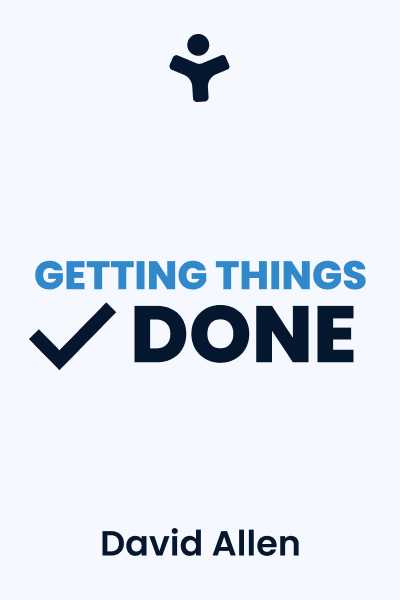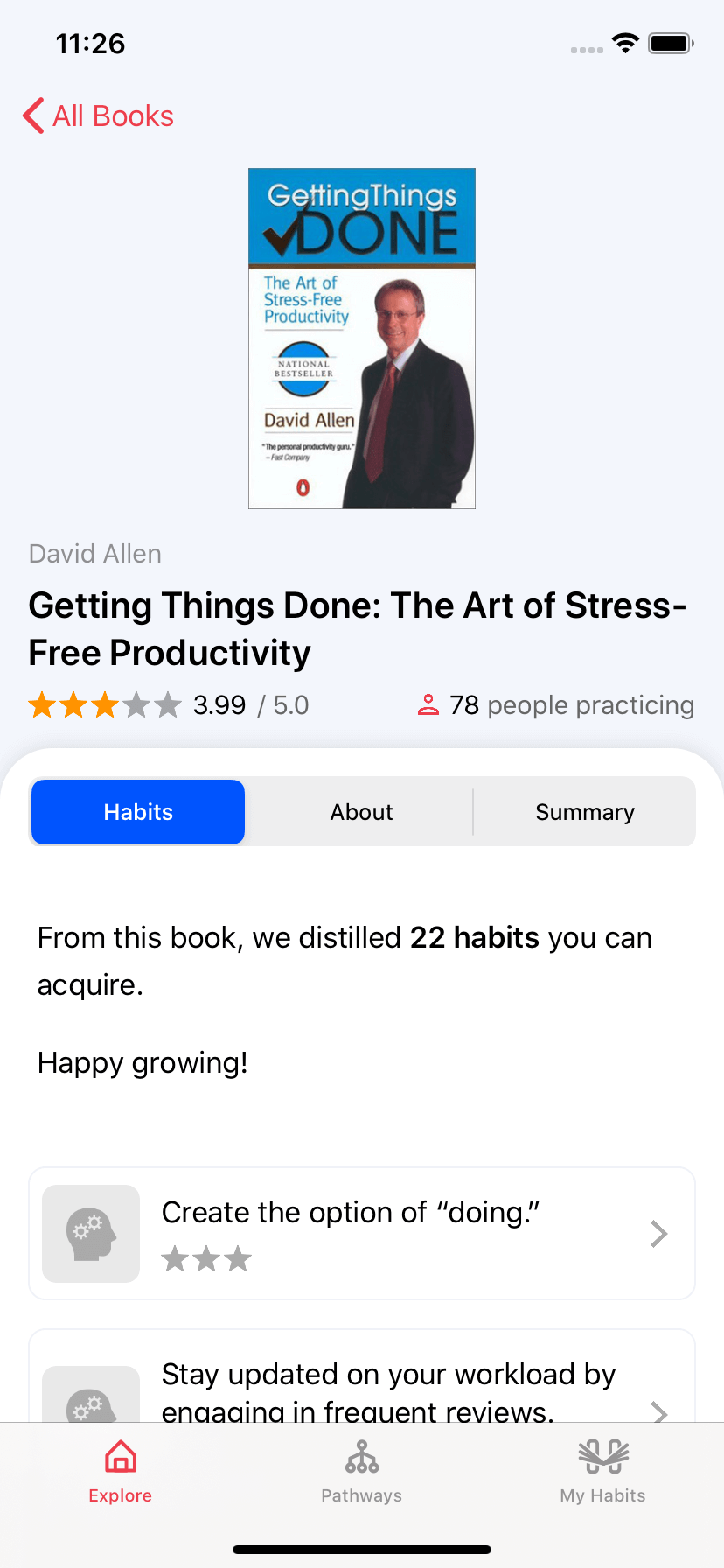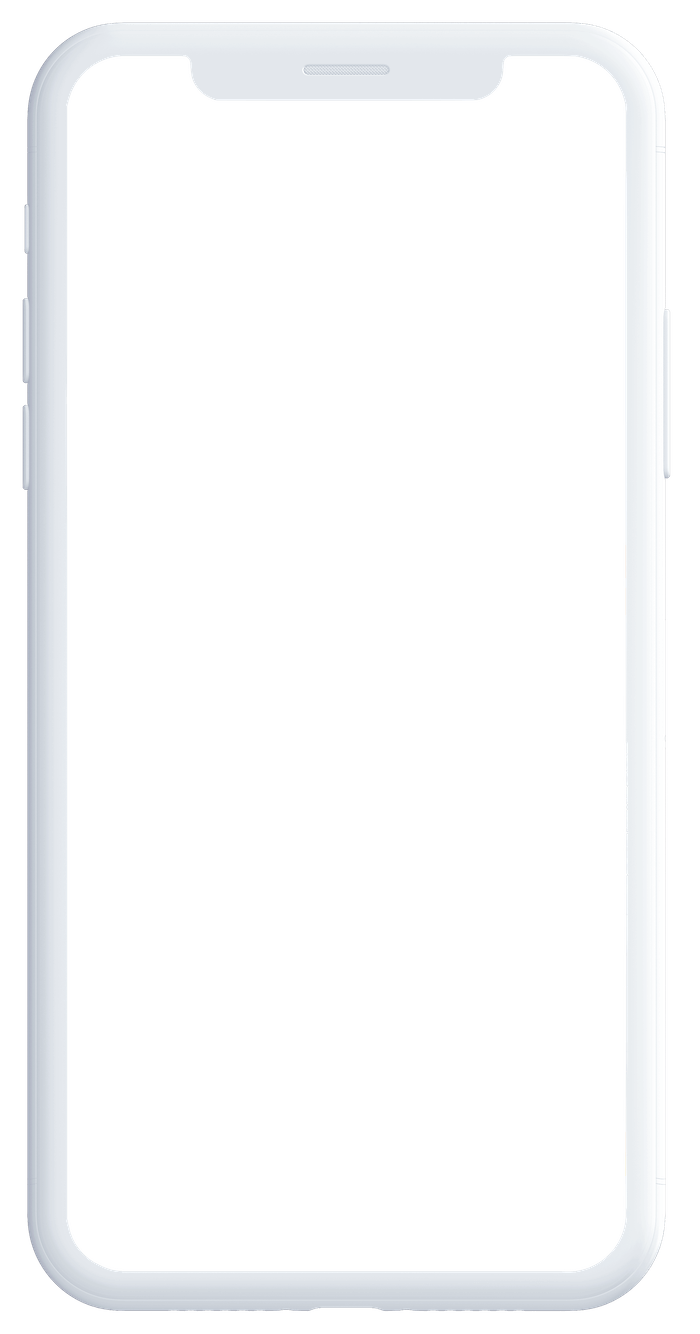
Getting Things Done: The Art of Stress-Free Productivity
by David AllenDo you feel like you’re not productive enough, like no matter how hard you try, you just can’t figure out how to get your work done? That’s where Getting Things Done comes in; this book will provide you with real, actionable steps to increase your productivity, complete your projects, and get things done!
This book aims to enable you to employ the fundamentals of managing workflow, implement an elevated and integrated total life management system, and leverage skills to create clear space and get things done. While this book focuses primarily on improving your productivity in the professional world, some actions can also be implemented to improve your interpersonal relationships and facilitate self-development.
A New Practice For A New Reality
“It’s possible for a person to have an overwhelming number of things to do and still function productively with a clear head and a positive sense of relaxed control.”
If you want to be a successful, high-performing professional, learning how to keep focused on your tasks without being overwhelmed by difficulties and obstacles is essential. Most people feel like they’ve got too much on their plate and not enough time to get everything done. This is largely due to the fact that there are no clear boundaries when it comes to working anymore - working over the weekends is common, being available nearly 24/7 is expected due to smartphones, and so on.
Plus, most people have a plethora of things to manage back at home too, whether it’s caring for kids or an elderly family member, keeping up a social life, allocating time for hobbies, so they don’t get burnt out, etc.
It can certainly get exhausting, and it often feels impossible to stay on top of everything!
The good news is that it is possible to learn how to stay 100% focused on your task at hand so that you can get constructive work done despite the complexities of work and life. The key to learning this skill is acting on the things that are stressing you out so that you can clear your mind instead of being stressed over them. After all, stress will just distract you from doing what you need to get done.
The good news is that it is possible to learn how to stay 100% focused on your task at hand so that you can get constructive work done despite the complexities of work and life. The key to learning this skill is acting on the things that are stressing you out so that you can clear your mind instead of being stressed over them. After all, stress will just distract you from doing what you need to get done.
Actions to take
Getting Control Of Your Life
"The timeless sense of meaningful doing that is the essence of stress-free productivity"
We go through five discrete stages during the workday: we capture what has our attention, clarify what each item means, organize the results, reflect on our options, and engage with our decision.
Each of these stages has its own best practices and tools, but they all function together as part of the greater whole. It's less about setting priorities and getting organized and more about hitting that sweet spot of productivity where you can stay present despite all the complexities. The quality of your workflow management is only as good as your weakest link in this chain.
Some people struggle with the capture stage; they may consider many ideas but rarely commit to anything on paper. Others may have collected many ideas but lacked clarity and are stuck on the next action. Even those who have a plan may not know how to execute it due to a lack of organization. Those who skip reflection will find that their strategies go out of date. What we choose to engage with matters, and timing is everything.
Actions to take
Getting Projects Creatively Under Way
To achieve the goal of getting things done and gaining control of your life, you will have to make significant changes. It is not as simple as “setting priorities” or “getting organized.” It requires a shift in mindset and commitment to an entirely new way of working and living.
One essential step to this shift is to adapt the natural planning technique when working on all your projects. Having a clear plan and vision of how we want the projects to get done will help us feel under control and be more productive and efficient in producing high-quality outputs.
When starting and working on any project, knowing how to brainstorm efficiently is very important, as you have to constantly come up with ideas along the way. Remember that in generating ideas, you should aim for quantity rather than quality. This means allowing yourself to think of as many ideas as possible without trying to streamline your list.
Evaluating or criticizing every generated idea could cause you to jump the gun and close your mind to ideas that have the potential to bring you closer to your goal. Finally, you should organize these ideas and categorize your projects appropriately so you can clearly identify your next actions.
Starting a project — from brainstorming to organizing it efficiently, is challenging, especially at first, but it shouldn’t be the reason to give up. Embrace this new, effective method of tackling what life sends your way. Soon enough, you will find that applying it to your life and any new issues are bound to crop up.
When you adopt this new work method, the way you think about work will change. You will be able to create maximum value while spending the minimum amount of time on a task. Plus, you’ll relieve yourself of a ton of stress too!
Actions to take
Practicing Stress-Free Productivity
“Having a total and seamless system of organization in place gives you tremendous power because it allows your mind to let go of lower-level thinking and graduate to intuitive focusing, undistracted by matters that haven’t been dealt with appropriately.”
Everyone uses little tricks to get them moving throughout the day. For example, if your goal is to exercise, a simple trick you can use to get motivated is to get dressed in your workout clothes. Similarly, there are many tricks you can use to get and stay motivated about your work so that you get things done!
Remember, managing your workflow in a meaningful way is about creating the optimal environment for you to be able to function instinctively in an effective and productive manner.
There is both a physical and mental aspect to this. The physical aspect refers to keeping your workspace clutter-free and organized, as this, in turn, will keep your mind clear so you can focus solely on the task in front of you. The mental aspect refers to having a positive mindset and learning how to make decisions quickly and efficiently so that you can start acting on those decisions and getting your work done.
A big factor in naturally channeling creativity and productivity is focusing on the right thing at the right time. For example, if you were late to work and trying to brainstorm ideas for a new project on the train while being distracted by all the other projects that require your input, you’re unlikely to come up with anything useful. However, if you were to sit in a quiet room and focus your mind solely on that one project for just three minutes, you would definitely come up with at least one idea relevant to your project.
Actions to take
The Power of the Key Principles
“When the whole gestalt of stress-free productivity is taken into consideration, it requires a solid progression that does not have shortcuts.”
The short-term benefit of learning the art of getting things done is, of course, getting your tasks done efficiently and productively. However, there are also long-term benefits! When you adopt this style of working, people around you will notice, and they will begin to trust in your capabilities. Your communication skills will improve, as will your interpersonal and professional relationships. This will also enhance your mental well-being and help you feel more self-confident, thereby driving you to keep performing well.
Directing your mental and imaginative processes to create change is a very abstract concept. However, you can practically apply it to your life, and you will get the benefits of it. To do this, you have to shift the way you think; instead of setting vague goals, create a step-by-step action plan for each task. Once you know what you need to do, it gets easier to actually do it!
Keep in mind that your mind is wonderful at recognition but quite poor at recall. If you were to look at today’s calendar, it would be easy to get a general sense of your day, the contents, and the contexts. However, it will be near impossible to recall the contents of the next 14 days simply from memory. This is why using your brain as your organizing system will make you feel stressed and overwhelmed, as most people do.
To improve your productivity and kick that feeling of “I can’t possibly get all this done,” you will need to use an “external brain” to organize your tasks. This will free up your mental capacity to focus on important tasks or those that require you to have a clear head.
Actions to take
Don’t just read. Act.



